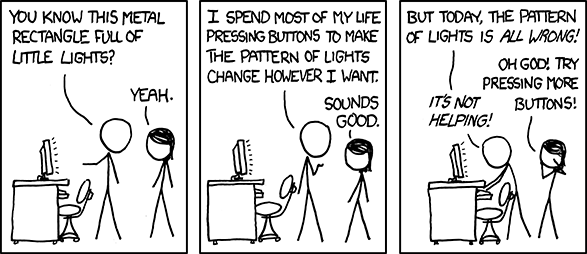At the beginning of class, Matt Gold asked us to write a definition of the Digital Humanities “as you would like it to be defined, not as it is defined.”
Definition at the beginning of class: The Digital Humanities is a set of computationally-based methods which study historical and contemporary artifacts and texts. I think Jamie Bianco’s statement about the Digital Humanities, “It does things to other things,” adds an important dimension to this.
There was much class discussion about definitions of Digital Humanities in relation to quantitative methods and the sciences. The parallel drawn between GIS and the Digital Humanities was particularly enlightening. A student said the field of geography had answered the question of whether GIS is a tool, a discipline or a field of study—yes, to all of these categories. GIS is now recognized as its own field of research, but also as a tool that can be used without knowledge of the theory behind it, similarly to the way some people say that you don’t have to be able to code to be a digital humanist. I think what happened with GIS in geography is a likely outcome of the debates around Digital Humanities.
During the discussion, Steve Brier pointed out that the structure that digital humanists work in, or aspire to work in, was created in the sciences where collaborative work using digital technology, and a quick process of review and publication is the standard. He said, jokingly, that humanists have been “slow” about catching on.
Are digital humanists laggards, or is this “slowness” partly because of differences between scholarly communication in the sciences and the humanities? Scientists have to move quickly to document their discoveries because the structure of the field requires it. Humanists work in a more drawn out time frame. Kathleen Fitzpatrick makes another crucial distinction, “The work in the sciences, on some level, is doing the science. The stuff that gets communicated afterward is the record of its having been done. Where in the humanities, the work is the thing that is communicated.” The insight that Digital Humanities projects are both the scholarly work and the communication of that work provides a context for thinking about the future of scholarly communications. Fitzpatrick says, “The sciences in their modes of communication are still very fixated on this object that is the journal article however it is distributed.” She says the strength of the humanities is that they are in a position to be “Utterly reimagining what the nature of scholarship can be. . . . That there are other forms that projects can take. They can take the form of Omeka exhibits . . . Scalar multimedia projects . . . databases . . . archives.”
After the class discussion, I would add a few words of explanation to the definition and also stress the role of communication in Digital Humanities projects.
Definition after discussion: The Digital Humanities is a set of computationally-based methods which study historical and contemporary artifacts and texts. Jamie Bianco’s statement about the Digital Humanities, “It does things to other things,” adds an important dimension to the description of Digital Humanities methodology by emphasizing that it is also about the creation of new artifacts, texts and tools that communicate interpretations and arguments.
Works cited
Bianco, Jamie Skye. Digital Humanities Interview Project. Video. Web.
Fitzpatrick, Kathleen. “The Humanities in and for the Digital Age.” Scholarly Communications Program, Columbia University Libraries. Video. 5 Mar. 2013. Web

 There There is no need to be afraid of coding! These days, DH job descriptions include a list of languages with which one should be familiar when applying (i.e., HTML, CSS, PHP, Python, etc.). I’ve seen more and more job descriptions asking for
There There is no need to be afraid of coding! These days, DH job descriptions include a list of languages with which one should be familiar when applying (i.e., HTML, CSS, PHP, Python, etc.). I’ve seen more and more job descriptions asking for 
